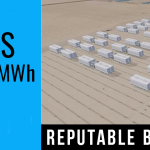 Global energy markets have been in flux for the past decade. Prices of solar and wind power are at record lows, natural gas is trading well below its historical average and oil prices are a fraction of where they were just a few years ago. Today’s low-cost environment is opening up new options for electricity generation, just as energy storage technology is coming of age.
Global energy markets have been in flux for the past decade. Prices of solar and wind power are at record lows, natural gas is trading well below its historical average and oil prices are a fraction of where they were just a few years ago. Today’s low-cost environment is opening up new options for electricity generation, just as energy storage technology is coming of age.
Solar and wind power has its limitations for the Middle East and North Africa as it only generates electricity when the sun is shining or wind is blowing – falling short at peak demand times in the evenings. In order to provide 24/7 service, renewable energy needs to be paired with a back-up supply, from baseload fuel sources such as natural gas, or from batteries.
Large companies are already investing heavily in energy storage batteries to meet growing demand for reinforcement of renewable energy supplies, in developed and emerging markets. Energy storage is also a growing area of focus for entrepreneurs, including in this region. At the World Economic Forum’s regional meeting in Jordan from May 19-21, we will hear from a number of small businesses who are at the crest of this critical market change.
For example, Energy24, based in Lebanon, has developed technology that can store and manage electrical power that provides 60 per cent savings over conventional generators, without the noise, pollution or carbon emissions. In Morocco, eLum has developed software that uses artificial intelligence to manage on-grid and off-grid energy costs for large industry.
For governments across Mena, including the UAE, the emergence of an energy storage market opens up a new set of decisions about how best to generate and distribute electricity. Critically, it offers the chance to lock in low-cost, emissions-free renewable energy for domestic consumption while reserving oil and natural gas for export.
Several Mena countries have already begun exploring energy storage as a way to integrate new renewable generation resources and improve the stability and reliability of national grids. The outcome of a recent solar photovoltaic tender in Jordan that included battery storage indicates that dependable electricity supply using solar power can be achieved at extremely cost-competitive pricing compared to fossil fuels.





